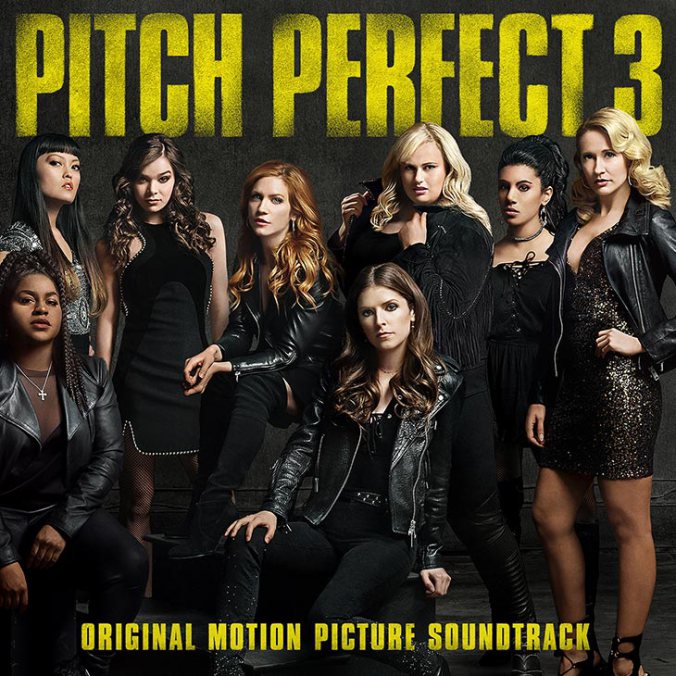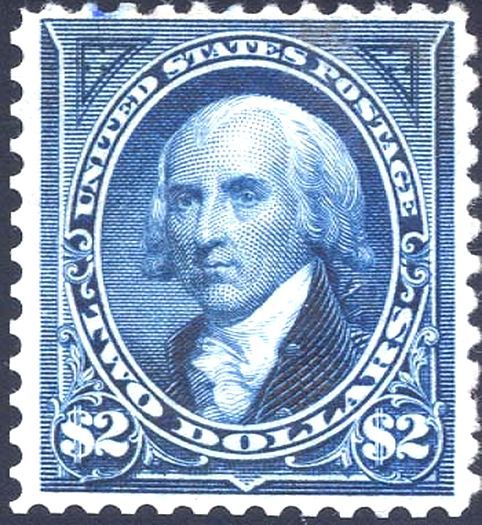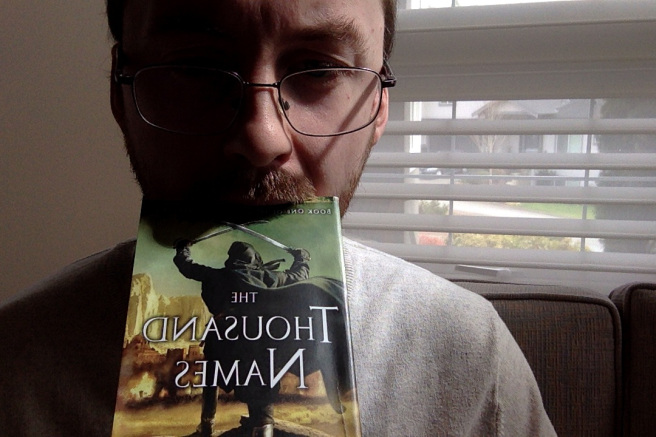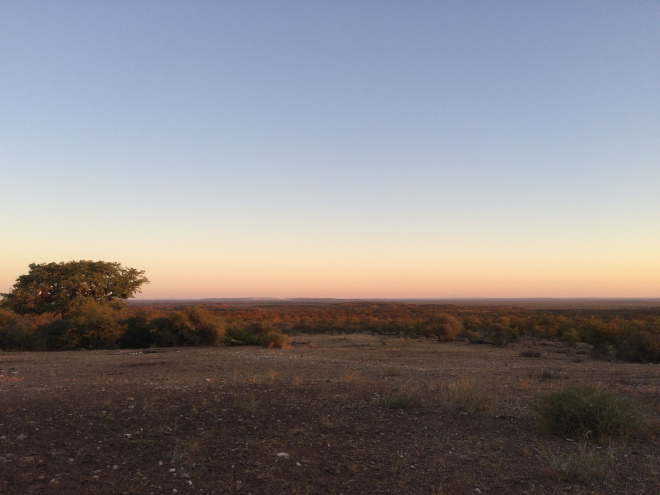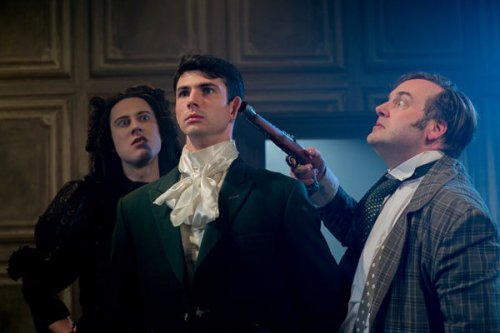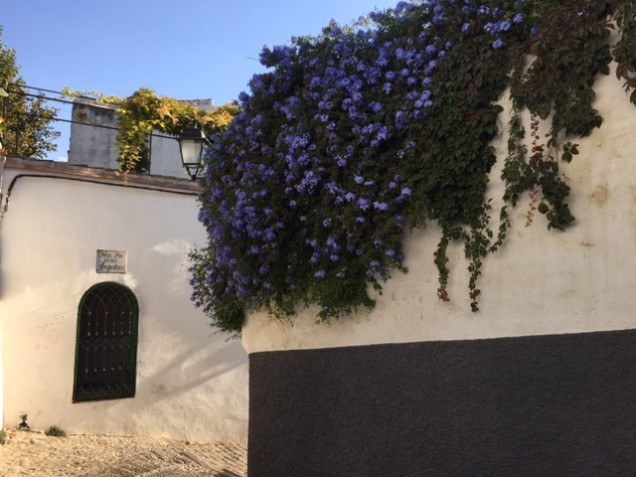 Plumbago living the good life in Granada, Spain, 7 October, a world away from this dark morning at my desk
Plumbago living the good life in Granada, Spain, 7 October, a world away from this dark morning at my desk
I’m continuing my reading of ‘The Buried Life’ which you’ll find here. This text from the Poetry Foundation shows all the stanza line breaks, which are for some readers missing from the versions I’m posting. It’s good to have the stanza breaks – they help show the chunks of thought and the startings again which characterise this poem, which is one of those where the poet tries to work out in thought and language something he has felt in feeling.
If you are joining newly today, try reading the whole thing, with plenty of pauses, following the run of sentences rather than the line-endings:
Light flows our war of mocking words, and yet, Behold, with tears mine eyes are wet! I feel a nameless sadness o’er me roll. Yes, yes, we know that we can jest, We know, we know that we can smile! But there’s a something in this breast, To which thy light words bring no rest, And thy gay smiles no anodyne. Give me thy hand, and hush awhile, And turn those limpid eyes on mine, And let me read there, love! thy inmost soul. Alas! is even love too weak To unlock the heart, and let it speak? Are even lovers powerless to reveal To one another what indeed they feel? I knew the mass of men conceal’d Their thoughts, for fear that if reveal’d They would by other men be met With blank indifference, or with blame reproved; I knew they lived and moved Trick’d in disguises, alien to the rest Of men, and alien to themselves—and yet The same heart beats in every human breast! But we, my love!—doth a like spell benumb Our hearts, our voices?—must we too be dumb? Ah! well for us, if even we, Even for a moment, can get free Our heart, and have our lips unchain’d; For that which seals them hath been deep-ordain’d! Fate, which foresaw How frivolous a baby man would be— By what distractions he would be possess’d, How he would pour himself in every strife, And well-nigh change his own identity— That it might keep from his capricious play His genuine self, and force him to obey Even in his own despite his being’s law, Bade through the deep recesses of our breast The unregarded river of our life Pursue with indiscernible flow its way; And that we should not see The buried stream, and seem to be Eddying at large in blind uncertainty, Though driving on with it eternally. But often, in the world’s most crowded streets, But often, in the din of strife, There rises an unspeakable desire After the knowledge of our buried life; A thirst to spend our fire and restless force In tracking out our true, original course; A longing to inquire Into the mystery of this heart which beats So wild, so deep in us—to know Whence our lives come and where they go. And many a man in his own breast then delves, But deep enough, alas! none ever mines. And we have been on many thousand lines, And we have shown, on each, spirit and power; But hardly have we, for one little hour, Been on our own line, have we been ourselves— Hardly had skill to utter one of all The nameless feelings that course through our breast, But they course on for ever unexpress’d. And long we try in vain to speak and act Our hidden self, and what we say and do Is eloquent, is well—but ‘t is not true! And then we will no more be rack’d With inward striving, and demand Of all the thousand nothings of the hour Their stupefying power; Ah yes, and they benumb us at our call! Yet still, from time to time, vague and forlorn, From the soul’s subterranean depth upborne As from an infinitely distant land, Come airs, and floating echoes, and convey A melancholy into all our day. Only—but this is rare— When a belovèd hand is laid in ours, When, jaded with the rush and glare Of the interminable hours, Our eyes can in another’s eyes read clear, When our world-deafen’d ear Is by the tones of a loved voice caress’d— A bolt is shot back somewhere in our breast, And a lost pulse of feeling stirs again. The eye sinks inward, and the heart lies plain, And what we mean, we say, and what we would, we know. A man becomes aware of his life’s flow, And hears its winding murmur; and he sees The meadows where it glides, the sun, the breeze. And there arrives a lull in the hot race Wherein he doth for ever chase That flying and elusive shadow, rest. An air of coolness plays upon his face, And an unwonted calm pervades his breast. And then he thinks he knows The hills where his life rose, And the sea where it goes.
Last time I’d got to
Ah! well for us, if even we, Even for a moment, can get free Our heart, and have our lips unchain’d; For that which seals them hath been deep-ordain’d!
and had stopped at the point where I’d been thinking about the imprisonment of the heart, the lips being chained, which seems one kind of forced restraint, and what happens in the last line of this stanza where the inability to get free seems more biological – the restraint, the seal, is ‘deep ordain’d’ , as if it were itself part of us – something in us can’t or won’t allow us to get to it.
Fate, which foresaw How frivolous a baby man would be— By what distractions he would be possess’d, How he would pour himself in every strife, And well-nigh change his own identity— That it might keep from his capricious play His genuine self, and force him to obey Even in his own despite his being’s law, Bade through the deep recesses of our breast The unregarded river of our life Pursue with indiscernible flow its way; And that we should not see The buried stream, and seem to be Eddying at large in blind uncertainty, Though driving on with it eternally.
I don’t know what Matthew Arnold means by ‘fate’ here. Perhaps another person would have said ‘God’, another ‘genetics’ or ‘psychology’.
When you find that happening in a poem, it’s worth making temporary reading in pencil. that’s to say, an easily-changed-if-necessary-reading. Penciling in a meaning here I’d simply say it is some force which has a powerful effect on human life. Fate, God, Genetics, Biology or any of the above.
I’m going to try a translation into my own thought and language, something I’d often do in a Shared Reading group – asking readers to try to translate that last long sentence ( it does seem long, doesn’t it?) into modern ordinary language in order to make it real. Here it is again:
Fate, which foresaw How frivolous a baby man would be— By what distractions he would be possess’d, How he would pour himself in every strife, And well-nigh change his own identity— That it might keep from his capricious play His genuine self, and force him to obey Even in his own despite his being’s law, Bade through the deep recesses of our breast The unregarded river of our life Pursue with indiscernible flow its way; And that we should not see The buried stream, and seem to be Eddying at large in blind uncertainty, Though driving on with it eternally.
‘Something’ in us knows how easily distracted humans can be by the superficial, by games, by politics, by power play, by war, by habit or custom or by any shiny thing…so distracted that we lose our own real identity. I’m just looking back to ‘every strife’ there – which is not so easily translatable. Let’s read again:
Fate, which foresaw How frivolous a baby man would be— By what distractions he would be possess’d, How he would pour himself in every strife, And well-nigh change his own identity—
What are we? Moving, plastic, adopting creatures who pour themselves into ant energetic call, any disagreement – I mean, what does he mean by a ‘strife’ and how does he get there from ‘distraction’? one minute we are playing with toys, next at war. First we are ‘possessed’ by distractions, next we ‘pour’ ourselves into any row that comes along – two kinds of distraction both of which seem to lead to us losing our original selves, and ‘well-nigh change his own identity’. Our plasticising, our creativity and lending ourselves might even work on our own selves. Having seen this, Fate acts to preserve something that can’t be touched:
That it might keep from his capricious play His genuine self, and force him to obey Even in his own despite his being’s law,
Humans seem like a baby that might play with small soft toy or just as happily with fire. Fate wants to preserve our ‘genuine self’ from our own stupid meddling and force us to be serious in one place, despite ourselves:
and force him to obey Even in his own despite his being’s law
Would we go against our deepest selves? Haven’t you seen that often? it is one of the downsides of human freedom and creativity. But whatever ‘Fate’ is, this power that Matthew Arnold has identified, can work against our playful messing about. There is still, untouched, ‘our beings law’ – something in us that runs under all that froth. ‘Even in his own despite’. Fate’s set up was to leave this core alone, out of sight, untouched and untouchable, yet some how strongly present, moving us. Whatever we do on the surface, Fate has bidden
… through the deep recesses of our breast The unregarded river of our life Pursue with indiscernible flow its way; And that we should not see The buried stream, and seem to be Eddying at large in blind uncertainty, Though driving on with it eternally.
While we are distracted by all kinds of shiny things from toys to war, there remains ‘the unregarded river of our life’
What is this? Is there anything any of us can find in our own experience to help us understand what Matthew Arnold is talking about?
Of course there is the difficulty that even as we try to see it, it is no longer unregarded – we’ve started to look. But perhaps looking is not the way – maybe it is more to do with feeling, after all, look how the poem started:
I feel a nameless sadness o’er me roll. … … But there’s a something in this breast…
It is, however nameless, there, despite the fact that we can’t see it and we ‘seem to be’ ‘Eddying at large in blind uncertainty’.
Wonderful image of the bit of flotsam caught in the stream and twirling pointlessly – that’s us at play, at war. And yet… and yet – let’s read again:
That it might keep from his capricious play His genuine self, and force him to obey Even in his own despite his being’s law, Bade through the deep recesses of our breast The unregarded river of our life Pursue with indiscernible flow its way; And that we should not see The buried stream, and seem to be Eddying at large in blind uncertainty, Though driving on with it eternally.
‘Driving on with it eternally’ is almost completely the opposite of ‘eddying at large in blind uncertainty’ – and the two actions are happening at once. On the surface, messing about, below the surface something serious and purposeful.
And this serious and purposeful part of the self is somehow deliberately kept apart, kept away from us, so we can’t meddle with it. Would we now call it, in some cases, ‘the unconscious’?
Are you aware of it, this stream, this permanence?
As I write I’m struggling to locate it, and I’m thinking about moments in life when it has seemed present. Both of my children as newborns. Some time looking at mountains. The colour of the sea lakes on the island of Mljet in Croatia. Shares of the colour blue. Some memories of church as a child. And oftentimes this has happened to me when reading – especially when reading Wordsworth. Is that what I’m talking about? I’m not sure.
More tomorrow.
Share this:
